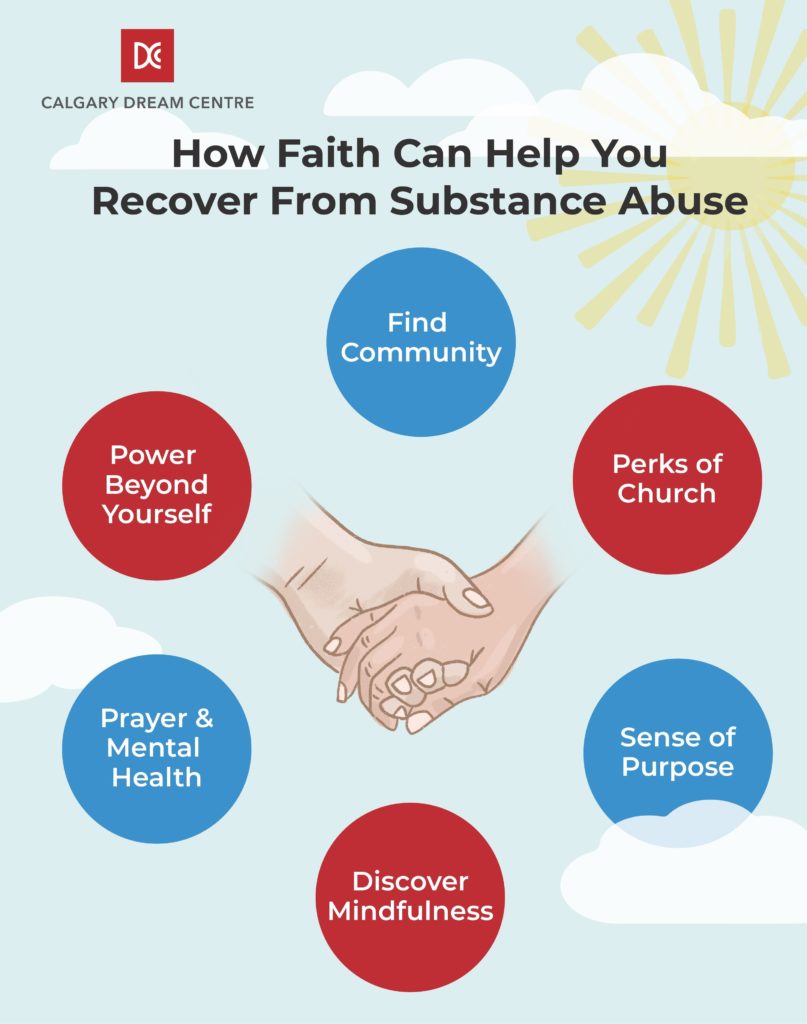Managing addiction is a huge task. It’s challenging, complex, and a bit different for each individual setting out to change their life for the better. And it’s not something you need to do alone.
Studies have shown that faith is a positive force in the recovery process. Every person’s spirituality and way of practicing or observing their beliefs is unique to them. All approaches to faith can be powerful tools in addiction recovery.
All of this together is why the Calgary Dream Centre uses a faith-based approach in our addiction recovery programs.

How Can Religion & Spirituality Help Me Recover From Substance Abuse?
Recovery from and thriving after addiction is a journey. It’s one that requires your body, mind, and soul to all be heading in the same direction. If you leave any one piece behind, you may find the voyage is much more of a struggle.
The link between faith and positive physical and mental health impacts is well-established in science. But you might find it’s intuitive, too. It just makes sense that having the support of a church community and a faith leader, and belief in a power beyond yourself is an important part of a successful recovery.
Established programs, like faith-based 12-step programs, have shown over the course of decades that trust in a higher power are important parts of a recovery program. And the benefits of faith on health aren’t limited to any one religion or version of spirituality.
If you don’t currently attend church, or left at some point in your life because it didn’t seem like it was right for you, there’s absolutely still a place for you within a new congregation or community. Here are some of the specific ways that your faith—newfound, rediscovered, or otherwise—can help you in treatment and beyond.
Finding Friends & Your Community
Addiction and recovery can both be incredibly isolating. Loneliness, something that’s become much more prevalent among Canadians during the social distancing required in the pandemic, may be a trigger for substance use.
Feeling like you’re the only one going through a particular experience is very hard. Though it might be difficult to believe at times, you truly are not alone. Sometimes it does take some work to find your community, though.
Becoming part of a supportive faith community, having strong relationships, and being able to turn to a trusted church leader can become a major part of your support system in recovery.
The Positive Effects of Going to Church
If spirituality and religion are new areas of exploration for you, you might be interested to know that there is research that suggests you can gain positive effects, such as happiness, meaning, and purpose, simply by attending religious services over time.
For those who already hold religious beliefs, research suggests they’re likely to see positive effects from going to church regularly, like in their social relationships, better health, and a longer life. Plus, going to religious services is associated with other positive health behaviours, like quitting smoking, less alcohol abuse, and less illegal drug use.
Finding a Sense of Purpose and Meaning For Life
For some, a perceived lack of purpose or meaning to life might be closely intertwined with their substance abuse experience. Finding meaning in life is no easy task, but it’s a worthy quest.
There are strong links between both attending church services and reading the Bible in helping people feel a stronger sense of purpose in their lives. At the same time, you may discover a sense of purpose as you meet other people experiencing difficulty. You could find yourself inspired to become someone who can help give back based on your own experiences of overcoming hardship.
Your purpose may shift depending on where you are in your journey. But by being part of a community and hearing other peoples’ transformative stories, you’ll be able to help form a vision of the future and begin creating it for yourself with support from your community.

Engaging in Mindfulness
In addiction recovery, mindfulness and acceptance are closely linked. For example, a person in recovery will often be encouraged to learn to accept their reality as truth. In Alcoholics Anonymous teachings, this aligns with the idea that “nothing, absolutely nothing, happens in God’s world by mistake.”
The practice of mindfulness during recovery can help avoid a vicious cycle of thinking. For example, it can help you identify unhelpful thoughts, like those about substance use, and then process and discard those thoughts, rather than ruminating over them.
The Benefits of Prayer on Mental Health
Your recovery journey is also a mental health journey. Along with talking to a counsellor, social worker, or other mental health professional, you may find significant positive effects on depression or anxiety through prayer.
Regular prayer sessions have been shown to greatly reduce depression and anxiety in study participants. If prayer is new to you, your church leader will be happy to introduce you to prayer in a way that works for you.
Finding Power to Succeed Beyond Yourself
When you’re in recovery from substance abuse, you may sometimes feel that you don’t have everything you need to succeed within yourself. That’s OK. This is a major journey, after all.
By finding faith in a higher power, you can allow your beliefs to support you in a way that you can’t all on your own.
Support to Discover Your Destiny & Realize Your Dreams
At the Calgary Dream Centre, you’ll be supported throughout your unique path to recovery, even when there are bumps along the way.
Learn about our addiction recovery programs for men and women in Calgary. We’re here for you.



